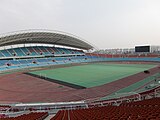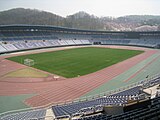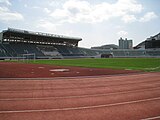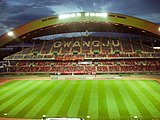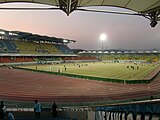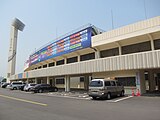An association football tournament was played as part of the 1988 Summer Olympics. The tournament featured 16 men's national teams from six continental confederations. The teams were drawn into four groups of four with each group playing a round-robin tournament. At the end of the group stage, the top two teams advanced to the knockout stage, beginning with the quarter-finals and culminating with the gold medal match at the Seoul Olympic Stadium on 1 October 1988.
The 2011 Korea National League was the ninth season of the Korea National League. The number of post-season playoffs' teams were increased to six and the playoffs were operated in the same format as the K League Championship. Before the start of the 2011 season, Yesan FC withdrew from the league due to its financial difficulty.
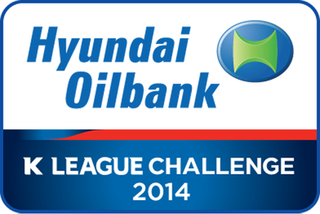
The 2014 K League Challenge was the second season of the K League 2, the second-highest division in the South Korean football league system. Since the 2014 season, the champions was promoted to the K League Classic and three teams from second to fourth-placed team qualified for the promotion playoffs after the regular season.
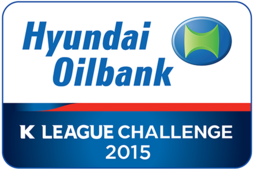
The 2015 K League Challenge was the third season of the K League 2, the second-highest division in the South Korean football league system. Champions and winners of promotion playoffs could be promoted to the K League Classic.
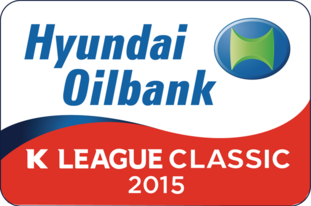
The 2015 K League Classic was the 33rd season of the top division of South Korean professional football, and the third season of the K League Classic.
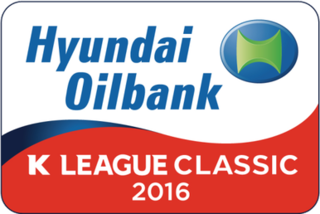
The 2016 K League Classic was the 34th season of the top division of South Korean professional football since its establishment in 1983, and the fourth season of the K League Classic.

The 2016 K League Challenge was the fourth season of the K League 2, the second-highest division in the South Korean football league system. Originally, K League Challenge champions could be promoted to the K League Classic, but Ansan Mugunghwa lost its qualification for the promotion after Ansan Government decided to break up with police football team from next year. Runners-up Daegu FC directly qualified for the Classic instead of champions Ansan Mugunghwa, and third, fourth and fifth-placed team advanced to the promotion playoffs.

The 2017 K League Challenge was the fifth season of the K League 2, the second-highest division in the South Korean football league system. Champions and winners of the promotion playoffs could be promoted to the K League 1.
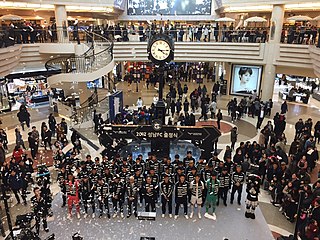
The 2017 Seongnam FC season is the club's first season in K League Challenge since its establishment in 1989 as Ilhwa Chunma Football Club and in its current name, Seongnam FC. The team will also competing in the 2017 Korean FA Cup.
The 2017 season is Ansan Greeners FC's 1st season of existence. They will participate in the K League Challenge as well as the FA Cup.
The 2017 Korean FA Cup, known as the 2017 KEB Hana Bank FA Cup, was the 22nd edition of the Korean FA Cup. The champions Ulsan Hyundai qualified for the group stage of the 2018 AFC Champions League. This edition introduced video assistant referee (VAR) system for the first time in Korean FA Cup history, using in the semi-finals and the final.
The 2018 K League 1 was the 36th season of the top division of professional football in South Korea since its establishment in 1983, and the sixth season of the K League 1, former K League Classic. The K League Classic was changed its name to "K League 1" in this season. As the 2018 FIFA World Cup start on 14 June, the last round before stoppage will be held on 19–20 May. The league will resume games on 7 July.
The 2018 Korean FA Cup, known as the 2018 KEB Hana Bank FA Cup, was the 23rd edition of the Korean FA Cup. Daegu FC qualified for the group stage of the 2019 AFC Champions League after becoming eventual champions.
The 2019 K League 1 was the 37th season of the top division of professional football in South Korea since its establishment in 1983, and the seventh season of the K League 1. Jeonbuk Hyundai Motors were the defending champions.
The 2019 K League 2 was the seventh season of the K League 2, the second-highest division in the South Korean football league system. Its champions could be promoted to the K League 1 the next season, and second, third and fourth-placed team advanced to the promotion playoffs.
The 2020 K League 2 was the eighth season of the K League 2, the second-tier South Korean professional football league. The champions and the winners of the promotion play-offs could be promoted to the K League 1. The second, third and fourth-placed teams qualified for the promotion play-offs.

The 2021 K League 1, also known as the Hana 1Q K League 1 for sponsorship reasons, was the 39th season of the top division of professional football in South Korea, and the ninth season of the K League 1. Jeonbuk Hyundai Motors won their ninth title and fifth consecutive title.
The 2021 K League 2 was the ninth season of the K League 2, the second-tier South Korean professional football league. The champions and the winners of the promotion play-offs could be promoted to the K League 1.
The 2022 K League 2 was the tenth season of the K League 2, the second-tier South Korean professional football league. The champions and the winners of the promotion play-offs could be promoted to the K League 1.
The 2023 K League 2, also known as the Hana 1Q K League 2 for sponsorship reasons, was the 11th season of the K League 2, the second-highest division in South Korean football league system. It had 39 matchdays and teams played each other three times.
